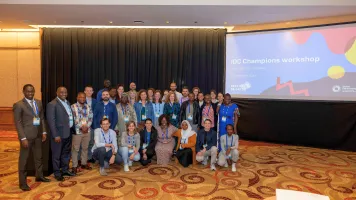Fulfilling global leaders’ promise to "leave no one behind" as part of the 2030 Agenda for Sustainable Development requires ambitious policymaking that is guided by inclusive data. Only with data that includes everyone, and data that is disaggregated to reveal sub-groups’ needs can governments and organizations identify marginalized people, understand and respond to their needs, and monitor their progress over time.
At this year’s High-Level Political Forum (HLPF), many of the UN member states presenting their Voluntary National Reviews (VNRs) prominently featured their commitments to leave no one behind (LNOB). While it is brilliant that LNOB commitments continue to be at the forefront of government’s priorities, VNR submissions often still lack disaggregated data, which is essential to truly understanding whether marginalized people’s lives are improving. Despite increasing awareness about the importance of inclusive and disaggregated data, it is clear that more concerted action is required.
To delve deeper into how some countries are generating more inclusive data and using it to inform policy decisions, the Inclusive Data Charter (IDC) convened a conversation with the following policymakers and statisticians from the Governments of Kenya, Peru, and Senegal:
-
Ms. Stefanie Bitengo, Monitoring and Evaluation Specialist, Social Protection Secretariat, Ministry of Labour & Social Protection of Kenya;
-
Mr. Aníbal Sánchez Aguilar, Deputy Chief of Statistics, National Institute of Statistics and Information Technology of Peru;
-
Mr. Gora Beye, Chief of Division of Growth and Fight Against Poverty, Ministry of Economy, Planning and Cooperation of Senegal.
“Does the policy work? With better data, we now know the answer.”
Kenya’s Social Protection Secretariat has evolved their approach to data in order to understand which people in need were being excluded from their programs and which people were accessing a program not designed to serve them. Ms. Bitengo explained that by strengthening their own data systems and working more closely with other government agencies and civil society, the Secretariat has been able to address inclusion and exclusion errors and ensure their resources are being targeted to reach the people who are most in need of support.
Mr. Sánchez explained the Government of Peru is using granular data from the census to understand which population groups are most in need of support. Peru is currently in the midst of a demographic transition, with an increasing older population that requires social protection. The government used census data to identify the districts with the highest percentages of older people, located mainly in the high Andean areas of Peru. Mr. Sanchez reiterated the importance of having disaggregated data that allows you to identify how regional disparities intersect with different population trends in order to optimize resource allocation and policy decisions.
When the COVID-19 pandemic reached Peru, the granular data from the census was quickly put to use by the National Institute of Statistics and Information Technology to map vulnerable populations. By integrating statistics and geospatial information, the government had quality, disaggregated data to fuel the fight against the pandemic.
Collaboration is key to not just getting better, more inclusive data, but making sure it is used.
Throughout the conversation, all of the speakers emphasized that working collaboratively with other government departments, multilaterals, civil society, and the private sector is essential to strengthening inclusive data systems. Mr Sánchez pointed out the importance of considering the interoperability of data sources across different types of stakeholders. And both Mr. Beye and Ms. Bitengo highlighted their respective governments’ efforts to develop harmonization frameworks to standardize data collection efforts, coordinate monitoring and evaluation processes, and share results more seamlessly.
Mr. Beye explained how Senegal’s Ministry of Economy, Planning and Cooperation (MEPC) is working with the CONGAD network - a civil society group in Senegal, currently chaired by Sightsavers - to identify data gaps and inform the MEPC’s priorities around inclusive data. The CONGAD network has hosted workshops with citizens to increase their understanding of, and engagement with, data collection efforts. MEPC is also exploring how to work more directly with civil society, research institutions, and the private sector on data production.
Ms. Bitengo discussed how the Social Protection Secretariat established a community of practice to bring together stakeholders working in social protection, including civil society and UN agencies, to learn from each other around inclusive data practices and improve data sharing. Through this collaboration and the resulting data, the Secretariat also hopes to reduce duplicative programming and increase the effectiveness of social protection systems.
Challenges remain around technical capacity and legal frameworks that underpin inclusive data systems
As well as highlighting the governments’ successes and learnings, the conversation also looked ahead and explored some remaining challenges. Mr. Beye noted that MPEC is prioritizing strengthening technical skills and organizational practices, and mobilizing financial resources, in order to respond more effectively to the demand for disaggregated data. Ms. Bitengo explained that Kenya’s Social Protection Secretariat is involved with developing a legal framework needed to enable data sharing across stakeholders.
The IDC was launched two years ago at HLPF - read more about the initiative’s progress here and follow @Data4SDGs and #IDCdata4all for the latest news and updates.

